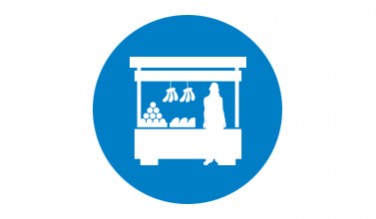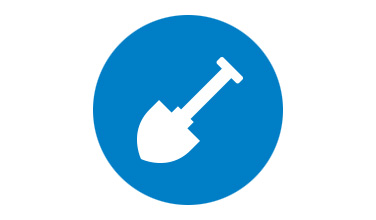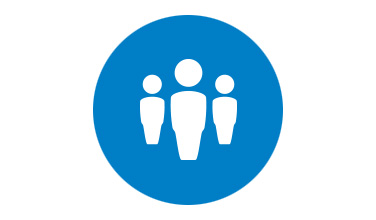Hand in Hand and the Primark Better Lives Foundation eliminate child labour in 99 communities
Hand in Hand and the Primark Better Lives Foundation have teamed up to eliminate child labour in 99 of India’s poorest communities.
Completed in September, the five-year programme opened 170 schools and learning centres, providing more than 7,600 school places, and helped more than 9,200 women launch family-based enterprises, benefitting some 46,000 family members.
“The Primark Better Lives Foundation has been working with Hand in Hand for more than four years now, funding a programme to fight poverty in the state of Tamil Nadu, India,” said foundation trustee Paul Lister. “What we most appreciate about Hand in Hand is their businesslike, entrepreneurial approach to tackling social challenges.”
Stamping out child labour has long motivated Hand in Hand’s work. In fact, our job creation model was developed as a direct response to child labour in India.
“Hand in Hand started as a small NGO struggling to eradicate child labour in Kancheepuram,” explained Hand in Hand Co-Founder Dr Kalpana Sankar. “We followed a child-centric approach, but quickly realized that broader social sensitisation was the key. In October 2004, the organisation shifted its focus to the community.” Put simply, when mothers work, children don’t have to.
Ten years later Hand in Hand has helped create 1.92 million jobs in 10 countries, improving the lives of 9.62 million family members – most of them children. The need for jobs is particularly acute in India, where only 29 percent of women older than 15 have paid work, even while more than 10 percent of children aged 5 to 14 are forced to work at least 14 hours a week.
“Our goal is to create 10 million jobs for some of the world’s poorest residents, helping to fight child labour in the process,” said Hand in Hand International CEO Josefine Lindänge. “Thanks to the Primark Better Lives Foundation’s generous donation, we’re one step closer to getting there.”
Celebrating entrepreneurial mothers on International Day of the Girl
Hand in Hand Eastern Africa’s CEO Pauline Ngari: Why we must celebrate entrepreneurial mothers on International Day of the Girl
As we support the International Day of the Girl we all know that girls are the future and that the brightness of that future depends on educating girls. But, I speak from personal experience when I say, that in order to educate the girl we must first empower the mother. I was that girl.
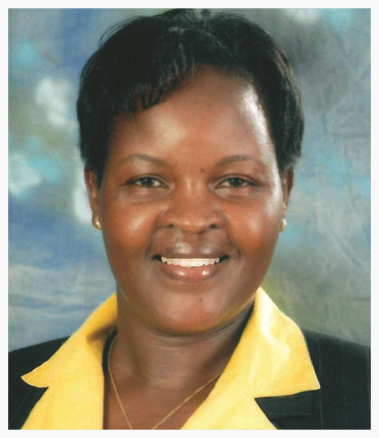
Pauline Ngari | CEO | Hand In Hand Eastern Africa
My story
I was born into a poor farming family in central Kenya. As one of eleven siblings, I helped to manage the family household as my mother tried to make ends meet by running a village shop. The income from that shop made all the difference to our lives and my mother was able to make sure that my siblings and I went to school.
When my mother’s shop failed, life became much harder for us all. And yet that failure is exactly why I set up Hand in Hand’s operations in Kenya in 2010.
My mother had an entrepreneurial spirit but she lacked any form of business training. At Hand in Hand we provide the business training people (predominantly women) need in order to start their own business and increase the family income. Since Hand in Hand first started in India in 2003 we have generated more than 1.4 million jobs and every day we see the transformative effect the resulting increased income has on people’s lives.
If you are poor then education is not your priority
If you are one of the 1.2 billion people who live on just US $1 per day then your priority, every day, is how to find the money to put food on the table and, if you are to survive, every member of the family must work towards that goal.
In such circumstances education is a luxury and figures from the UNESCO Institute for statistics back this up – there is a clear link between household wealth and the probability of not being in school. Compared with children from the richest 20 percent of households, children from the poorest 20 percent are four times more likely to be out of school. Crucially, although girls are always more likely to be out of school than boys, the disparity shrinks with increasing household wealth. Further, we know that women typically invest a higher proportion of their earnings in their families and communities than men (OECD).
The making of entrepreneurial mothers – a success story
This is why Hand in Hand’s business training model is aimed primarily at women. We have developed a system that encourages people to learn the power of group support and a shared goal; that encourages the poor to save just a little each week so they can start their own business or secure a loan; that teaches the poor how to run a small business, not in a classroom with a whiteboard, but with leaders from their own community, through parables, stories and songs.
In just ten years we have provided basic business training to more than a million of the world’s poorest women who have gone on to create some 1 million small businesses.
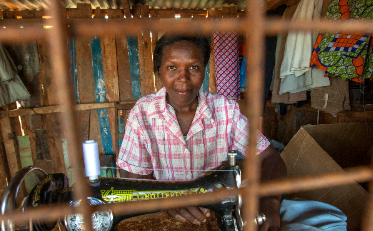
Hannah Haciku | Tailor | Nairobi, Kenya
Hannah Hackiu (pictured left) is one of our many success stories. Born into an impoverished family in central Kenya, her parents could not afford to educate her and so she was married off into another family. Now a mother herself, Hannah’s overriding ambition is to earn enough money to educate her children and ensure theirs is a different future.
With training from Hand in Hand she used her talent for sewing to set herself up in business as a tailor. Within a year, Hannah earned a monthly income of KES 5,000 (US $58) which she invested in changing her family’s life for the better. Now 33, Hannah says she will able to send her 13-year-old daughter to secondary school, giving her the opportunity she did not have herself.
This piece originally appeared on BusinessFightsPoverty
Saving is not a luxury
Hand in Hand Eastern Africa’s CEO, Pauline Ngari: Why saving is the first step on the ladder out of poverty
When World Savings Day was first launched in 1924 the aim was to encourage people to put their savings in a formal bank account rather than ‘under the mattress’ so that they could manage and save their money efficiently.
Today, as we celebrate the 79th World Savings Day, half the world’s population, some 2.5 billion adults, still do not have a bank account. Most of those people live in poor, rural areas in developing countries. For instance, here in my native Kenya, just 42 percent of the population has a bank account – compared to 97 percent in the UK.

Pauline Ngari | CEO | Hand In Hand Eastern Africa
Why should this matter? If you are unbanked, it is that much harder to manage your money and that means you are not saving. In the absence of insurance and formal social safety mechanisms, savings are what see families through economic hardship. As they often cannot access formal credit, savings also provide the poor seed capital to start a business or the finance to expand one.
However, if you are poor, living at the margins of society and excluded from financial institutions, can you really save? Do you have any ‘spare’ money? And if you do, can you save enough to make a difference?
We often assume the answer is ‘No’, but I speak from personal experience when I say that the answer to these questions is emphatically ‘Yes’.
I was born into a poor farming family in central Kenya. After school I helped to manage the family household as my mother tried to run a village shop. When my mother’s shop failed, life became much harder for us all.
However, that failure is exactly why I set up Hand in Hand’s operations in Kenya in 2010. My mother had an entrepreneurial spirit but she lacked any form of business training. At Hand in Hand , we have developed a business creation model to enable people to start and run their own enterprise, increase their income and climb out of poverty.
And we know it works; globally, some 1.5 million people living in poverty in Asia and sub-Saharan Africa have – with our support – saved enough to set up and run over one million businesses.
First we create community groups, mainly women, who support each other, save together and learn together. Members learn to manage money – how to save as well as how to borrow and repay a loan. Here in Kenya – where the national saving rate is only half of the average for all low-income countries – we are running savings campaigns during which our members manage to save an average of 3,500 Kenyan Shillings over six months – a significant achievement when 62 percent of them support entire families on less than KES 5,000 per month (US $60).
Then we train the group members to discover and develop small businesses that make use of their skills and potential.
Next, if needed, we provide access to microloans and finance. Such is the success of our business creation model and the support across the group that 99 percent of these microloans are paid back.
Finally we help turn our members’ ideas into a larger commercial reality, take them to market and achieve sustainable growth, which in turn benefits their families and communities.
Take Philomena Nduku Mutuku, a 67-year-old shop-owner who used to earn just KES 500 (US $6) a week fetching water from the local well for her wealthier neighbours: “I did not go to school, but I am a fast learner: thanks to the Hand in Hand training, I can now control what I spend. So, I would estimate what I really needed every week and challenge myself to save the rest”.
Encouraged to save just a little each week, Philomena eventually had enough to invest in the necessary stock for a small shop – the only one in a 15km radius from her village.
As a direct result of saving, Philomena has moved on from carrying water to become an independent businesswoman who today earns some KES 1,000 (US $12) a day.
And that is the power of saving.
Originally published on Pauline Ngari’s Huffington Post blog
Young Mothers Programme review: ‘Success is almost guaranteed’
Young Mothers Programme Creates ‘Much Better Opportunities’
“Success is almost guaranteed” to women who complete Hand in Hand Eastern Africa’s Young Mothers Programme, according to an independent mid-term review conducted by Brinjal, a UK-based consultancy specialising in livelihoods analysis. The study comes ahead of International Women’s Day on March 8.
“Happiness’ does not simply feel good, but helps (people) function better.” Happiness expert Professor Ed Diener
Launched in Kenya in 2012, the Young Mothers Programme mobilises mothers between the ages of 13 and 30 who, despite lacking skills and training, are major breadwinners in their families. The program combines Hand in Hand’s job creation model with psycho-social support – or, as it’s referred to by participants, “freeing of the mind” – from Clowns without Borders Sweden (CwB), a non-profit organisation that works to “spread laughter, joy and hope” to people affected by conflict and poverty. The project is funded by the Swedish Postcode Lottery.
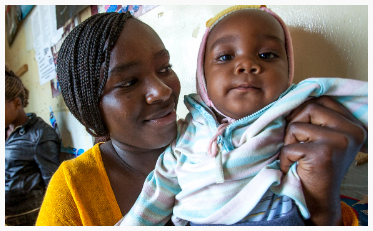
Halima | Young mother and business woman | Kawangware, Kenya
“(Young mothers) understand the benefits of mutual support. They are bright, energetic and dynamic in applying the training provided by the HiH model,” says the review. “When visiting a group that has been operating for 9-12 months it was very clear that most members have established business ventures which mean that they are no longer forced into the casual labour market on a daily basis and have a much better opportunity to plan their livelihoods and look to the future.”
The report also said CwB’s contribution “enhanced the group mobilisation process. Through a series of songs, storytelling and games the group members succeed to shake off the stress of daily life, build solidarity and concentrate fully and equally on the group task at hand.
“In fact,” it continued, “the (Business Relationship Officers) find the techniques so effective that they are being used with (community self-help) groups, not just the Young Mothers Groups.”
No comprehensive research has been done into the benefits of stress-relief in developing world Self-Help Groups, but lots of studies are more broadly applicable. Happiness expert Professor Ed Diene of University of Illinois, for example, “finds that in general ‘happiness’ does not simply feel good, but helps (people) function better.”
The review also identified several areas for improvement. Retaining new members – forced to forego casual labour typically paying 200 Kenyan shillings (US $2.30) a day to attend the group sessions – was chief among them. Planning is underway within HiH Eastern Africa to implement the recommendations.
Young mothers programme by the numbers
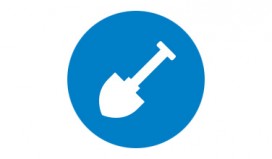
Jobs created: 1,236
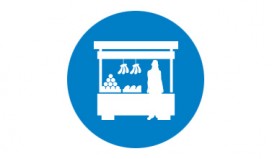
Businesses created: 927
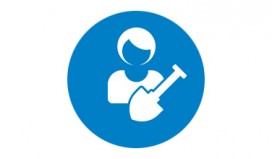
Mothers trained : 1,930
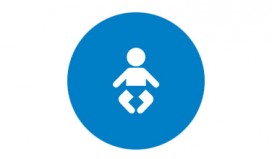
Children enrolled in school: 1,769
Hand in Hand Afghanistan expanding with grant from EU
Now is a crucial time for Afghanistan.
Already, the country is in the process of electing its first new president after 12 years under Hamid Karzai. By the end of the year, with the whole world watching, that president will oversee the withdrawal of the International Security Assistance Force, inheriting main responsibility for the country’s security for the first time in just as long.
Despite uncertainty over Afghanistan’s future – or indeed because of it – Hand in Hand is committed to remaining in the country. In fact, we’re expanding our reach thanks to a game-changing US $1.16 million (€840 K) grant from the European Union. Launched in February 2014, the deal marks a series of milestones for Hand in Hand:
- Our first grant from the European Union.
- Our first time working in Samangan Province, bordering Hand in Hand Afghanistan’s most developed operation in the province of Balkh. Samangan offers relatively stable security, support from local stakeholders and, given the absence of similar programmes in the region, the opportunity to make a transformative impact.
We’re also introducing a number of upgrades adapted to suit Afghan conditions:
- Literacy and numeracy training.
- Vocational training and toolkits for in-demand skills such as beekeeping, silkworm rearing and motorcycle repair. Farming productivity in Afghanistan has fallen by half during 30 years of near-continuous war.
- Shari’a-friendly microfinance. Profitable lending is prohibited by Islamic law, causing most microfinance institutions to avoid Afghanistan. To help plug the gap we’re bringing our successful Enterprise Incubation Fund to the country.

